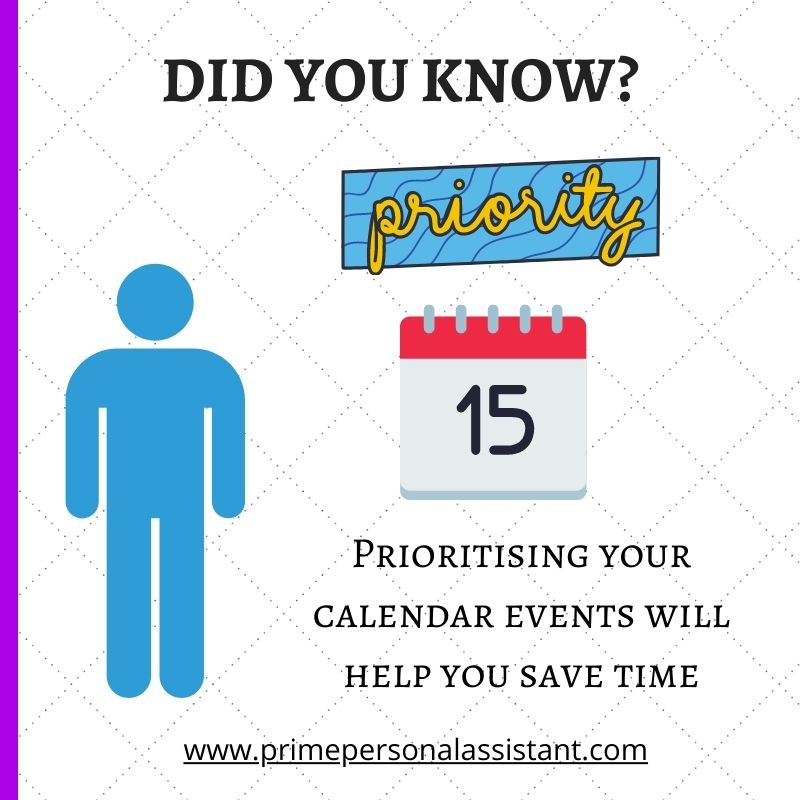Calendar Management Skills

Calendar management is the process of organising meetings, events or tasks in a way that increases productivity and saves time.
Improving your calendar management skills will help you make the most out of your time. By focusing on time management and prioritising correctly, you will get more done in the time that you have.
Whether you are managing multiple calendars, a calendar for yourself or a client, you will need to organise a few things to help the process run smoothly.
Choose how you want to manage your calendar.
Will this be using a calendar management app, or will you be using a traditional style organiser.
Some people still like the traditional style organisers. I use a physical paper organiser as a calendar for personal use.
For business, I prefer to use a digital calendar app.
If it is your calendar you are managing, then you can do whatever works for you. If it is a client’s calendar, you may not have control over which type of organiser they want you to use.
There are many different nice paper organisers available with different sections and dividers to help you stay organised.
When it comes to digital organisers, you are faced with so many different options as it’s the number one choice for many people wanting to manage their calendar.
The digital calendar management app I use is ClickUp it helps me to stay organised. I love using the colour coding feature, it is so satisfying when I complete a task and it gets colour coded. It makes it easy to see your progress and motivates you to finish.

Create a prioritising system
Once you have chosen the type of calendar you will use, you need to create a system to prioritise your calendar entries.
Do this by deciding how important and urgent each task is. Then determine the priority level for each task, whether it is high or low.
Important and Urgent – Highest Priority
When an activity is urgent and important, this needs to be the first thing on your to-do list. Schedule this in first.
As it is a priority, it will help make way for the rest of your week to be more relaxed as you won’t have to complete important/urgent tasks at the last minute.
To give yourself the attention needed for these important and urgent tasks, schedule this in the 1st part of the week.
Important but not urgent – Normal Priority
This is something that is important, this could be something you have committed to or something that will benefit you greatly, but when you take everything that must be done into account, you know some things are way more urgent than this.
To manage your time wisely, schedule this type of task in the 2nd portion of the week.
This way, you are making sure what is important to you is still getting done. Even if it is not urgent, time is still being made to get it done.
Urgent but Unimportant – Normal Priority
There is something you need to get done urgently, but when you compare it to the other stuff you also need to do urgently, you realise it is not as important.
This category or task is better assigned to the first portion of the last half of your week.
An activity like this is urgent but will probably not be of much benefit to you. You may want to consider delegating it to a colleague, virtual assistant, or the person most suitable to do it. This way, you can do something that will benefit you more with that time instead.
Unimportant and not urgent – Lowest priority
We all have those things in our business that are not important and are not urgent, but they still should be done. These tasks have the lowest priority and should naturally get pushed to the back of the queue.
You can schedule these for the last part of your week.
However, what can happen as a solopreneur is you may not have the time or energy to complete tasks in this category within a reasonable time, as you are probably already doing so much.
To prevent this, schedule at least 1 (or more if you can squeeze it in) tasks within the Unimportant and not urgent category into your daily schedule.
This way, no matter how busy you are, those little things that are not quite that important are still getting done.
Task Grouping
Grouping together similar tasks will also help you to manage your calendar better.
For example, if you have three different tasks requiring you to use the same software that takes you 10 minutes to load and log in, you should group them together.
Either way, if you are already doing something similar, then you may as well complete other similar tasks around the same time.
You should be grouping items within your priority category.
For example, if I have three urgent and unimportant tasks requiring me to use Canva design software, I might as well do them all simultaneously and schedule them all back to back for the first portion of the last part of the week.
Depending on the type of activity, task grouping will help you complete it faster or better as you will have built up momentum and confidence as your mind stays focused on one type of activity. As a virtual assistant, I do multiple different tasks. There are some that I prefer over others. When I group tasks, I get to spend more time doing the tasks I enjoy the most, all at once.
On the flip side, it means the activities you enjoy the least are being grouped together. If you don’t want this, you don’t have to group these activities, but it may save you time if you do.
Rescheduling
In a perfect world, we would stick to every bit of our schedule and never need to reschedule; however, sometimes, it will be unavoidable.
Some things will need to be pushed back, whilst others may need to be brought forward. Using the priority system and time management skills, you can easily make these changes.
Buffer and Breaks
Don’t forget to schedule regular breaks as well as a buffer time in between activities. A buffer will give you time to transition into the next activity. It will also prevent activities that run for too long from interfering with your other arrangements.
When managing multiple clients calendars you will need to know what is important to your client and what is not in order to manage their calendar the best way. The priority system will show you where your time is best spent. Usually a client will tell you what they want and what they don’t want their working week to look like. Other clients may not give you that much instructions and just expect you to work out the best schedule for them. If you stick to prioritising and task grouping, your clients will see an increase in their productivity.
Do you want to improve your productivity?
Enrol in the FREE Virtual Assistant Management Course, this course shows you how to be 100% more productive. It is not just for virtual assistants but also entrepreneurs who want to get more efficient and serious about increasing their productivity.


To discuss how one of our virtual assistants can help your business.

To discuss how one of our virtual assistants can help your business.

